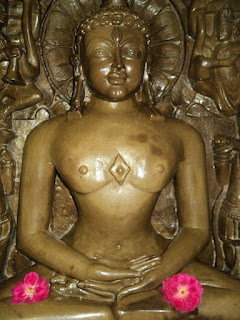This is a picture posted from someone in Pakistan who subscribes to Jainism. While an eastern Hindu oriented worldview, it has followers around the world. For westerners, the symbol (left) may suggest to us that this is not for us. But do not be distracted by the optics, many of people in all cultures are attracted to the Jainism, whether they call it that or not.
Jainism claims that society does best when three principles are embraced by its members - non aggression, non possession, and relativism. Don't fight each other, don;t hoard goods and let everyone believe as they wish. The result is a society full of peace, love and harmony. How can anybody be against that?
Interesting, the advocates for Jainism made two posts recently on Linkedin. One post was lamenting the destruction of the Jainish Temple in Lahore, Pakistan. The other post was praising the Muslin leaders in Middle East countries for denouncing and standing up against the perpetrators of violence Islamic extremism.
Do any of you see the problem with this picture. First, why would they lament the destruction of their Temple if they do not value possession? Isn't owning a Temple a possession? And why would they be upset if there are people who want a train to run where the Temple stood? Don't these people who want a train have a right to what they believe?
What about the Islamic extremist? Don't they have a right to their beliefs? Relativism means that there is no moral superiority among people groups. If people can believe whatever they want, then you may want to fight them on economic or political grounds, but you can't fight them on moral grounds. Oh, by the way, why is there support for the aggressive stance against Islamic extremists? Where's the peace, love, and harmony with them?
The fact is Jainism is not really any different than every culture in the world. Each believe that there exists a set of behaviors that members in society can exchange for the benefit of the society. Fair exchange is the virtue by which society prospers. However, when truth is relative, it is impossible for the "virtues" of society to all be realized. Relativism means anyone's exchange is considered a virtue as long as it is fair. But fair to whom? Fairness is subjective, too. What's fair to one person violates another's rights. That's why we see advocates of tolerance the loudest voices against conservatism in the US. What sense does that make?
We feel relativism and its twin tolerance is right and virtuous because we don't trust what we believe to be absolute truth. Its kind of an "honor system" we have with each other, "I won't impose my flawed believes on you if you won't impose yours on me."
Therefore, relativism feels good because it feels virtuous, but in reality relativism is not virtuous. Any action by anyone is accepted as right as long as it is what they believe. Virtue exists when actions produce actual harmony, not an aspiration of harmony that cannot be realized by competing self-serving semblances of "virtue".
It "feels good" to eat whatever we want. But a healthy body does not result and we eventually do not "feel very good" when we are over weight and out of shape. There is a truth about what puts all of the body in harmony with itself. Aligning our actions to this truth is what matters, not what we each one feels like doing.
Only when that which is absolutely true is what everyone orders their lives around will a society rise above self-serving relativism. Absolute truth makes "feeling good" a reality, not an illusion. Only then is there peace, love and harmony.


No comments:
Post a Comment